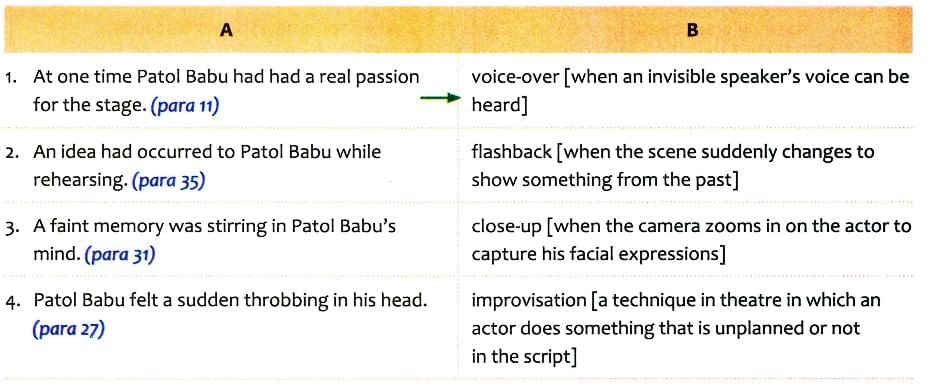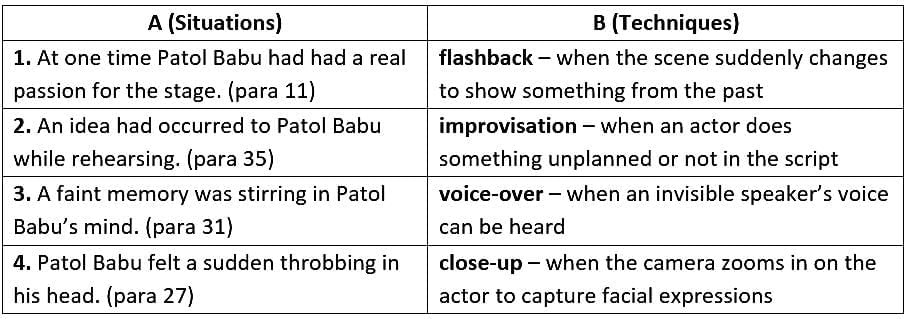Textbook Solutions: Patol Babu, Film Star | Gul Mohar Class 8: Book Solutions, Summaries & Worksheets PDF Download
| Table of contents |

|
| Before You Read |

|
| While Reading |

|
| Understanding the Text |

|
| Appreciating the Text |

|
Before You Read
Q. Acting can be quite challenging. List three qualities you think are essential to be a good actor.1. ____________
2. ____________
3. ____________
Ans: (1) Dedication to the art – a good actor must practise regularly and remain committed even when roles are small.
(2) Ability to express emotions naturally – to connect with the audience by showing real feelings.
(3) Confidence and discipline – to perform without fear and remain focused, even under pressure.
While Reading
Q1. Patol Babu mixes up his wife's orders because...Ans: Patol Babu mixed up his wife’s orders because he was so overwhelmed by excitement after receiving the film role that he could not focus on anything else. His mind was completely occupied with thoughts of acting, so he absentmindedly bought the wrong items at the market, reflecting how deeply the news affected him.
Q2. Underline the sentence that tells us that Patol Babu must have been good at acting.
Ans: “Indeed, there was a time when people bought tickets especially to see him.": This shows that Patol Babu had real acting talent and was once a respected performer. The fact that audiences bought tickets just to watch him proves that he was popular and admired for his skills.
Q3. Why do you think Patol Babu was diffident?
Ans: Patol Babu was diffident because he had not acted for many years and felt unsure about his abilities. He worried whether he still had the skill and stage presence to perform convincingly. His lack of self-confidence made him nervous about the small film role, though deep inside his love for acting had not disappeared.
Q4. What is Shoshanko doing here?
a. comforting Patol Babu
b. flattering Patol Babu
Ans: (b) flattering Patol Babu: Shoshanko exaggerated the importance of the small role and called him “lucky,” even though it was just a one-word part. His aim was to make Patol Babu feel valued and motivated, so he praised him to boost his spirits.
This was flattery because the role was minor, but Shoshanko wanted Patol Babu to take it seriously.
Q5. Why does the writer describe Patol Babu’s action without describing his thoughts?
Ans: The writer describes Patol Babu’s actions rather than his thoughts to let the readers feel his nervousness indirectly. By showing his gestures, movements, and behaviour, the scene becomes more vivid and dramatic. Readers can sense his emotions—uncertainty, anxiety, and excitement—through action alone, which makes the narrative more powerful than simple explanation.
Q6. Does ‘true actor’ mean
a. a successful actor?
b. an actor devoted to the art of acting?
Ans: (b) an actor devoted to the art of acting: A true actor is not measured by fame, popularity, or wealth, but by his sincerity in treating even the smallest roles with seriousness. Patol Babu’s devotion to rehearsing a single word proved his commitment to the art more than outward success ever could.
His dedication shows that being a “true actor” is about passion, not status.
Q7. Patol Babu is satisfied with his performance. But we are not always successful in our efforts. What should we do if we do not do well at times?
Ans: If we do not succeed, we should not lose heart or give up. Failure should be seen as an opportunity to learn and improve. By staying patient, working harder, and practising with sincerity, we can achieve better results in the future. Continuous effort and perseverance eventually lead to growth and success, just as Patol Babu felt fulfilled by giving his best effort.
Understanding the Text
A. Complete these sentences.
1. Patol Babu's part was that of an absent-minded, _______________________.2. When Patol Babu reached the location the next day, he felt nervous because ____________________.
3. Patol Babu felt disappointed after he got his lines because ___________________________.
4. Shoshanko told Patol Babu that he was lucky because _________________________.
5. Right before the shot, Patol Babu felt ______________________.
6. When he was called for the shot, Patol Babu asked for a newspaper because ______________________________.
Ans: 1. Patol Babu’s part was that of an absent-minded, short-tempered pedestrian.
2. When Patol Babu reached the location the next day, he felt nervous because there was a big crowd and he had not acted in years.
3. Patol Babu felt disappointed after he got his lines because his dialogue was only a single word: “Oh!”.
4. Shoshanko told Patol Babu that he was lucky because he had a speaking part in a Baren Mullick film.
5. Right before the shot, Patol Babu felt keen anticipation and excitement like he used to feel on stage years ago.
6. When he was called for the shot, Patol Babu asked for a newspaper because he thought it would make his acting more natural.
B. Answer these questions.
Q1. “I really don’t see why I should say no.” Do these words reflect Patol Babu’s excitement about the acting opportunity? Why is he trying to hide his real feelings? (para 8)Ans: Yes, these words show Patol Babu’s excitement. After years away from acting, the chance to perform again thrilled him. However, he tried to hide his real feelings to appear practical and calm before others. Inside, he was eager, but outwardly he pretended not to care too much, as if acting was just another task. This contrast highlights his humility and suppressed passion.
Q2. Why did Patol Babu have to give up acting? How did he feel about it? Which line in para 11 tells you that?
Ans: Patol Babu gave up acting after he lost his job during the war and needed to find other ways to support his family. Though he moved on, he felt deep regret about abandoning the stage. This feeling is captured in para 11, where he remembers his acting career “with a sigh,” showing how painful it was for him to leave behind something he loved.
Q3. A member of the shooting crew tells Patol Babu, “Just think how crucial the shot is.” Is the role truly ‘crucial’? Why does he say so to Patol Babu? (para 29)
Ans: The role was not truly crucial, as it was only a single-word part. However, the crew member exaggerated its importance to encourage Patol Babu. He wanted him to believe his role mattered so that he would act with seriousness and confidence. By saying this, the crew member ensured Patol Babu treated the moment with the dedication it deserved.
Q4. “... A play involves the work of many and it is this combined effort that makes a success of the play.” (para 31)
a. Who said these words to Patol Babu?
Ans: His mentor, Mr. Pakrashi, said these words to him.
b. How was Patol Babu feeling when he remembered these words? Why?
Ans: Patol Babu was disheartened on learning that his dialogue was only one word. Remembering his mentor’s advice gave him strength. It reminded him that even small roles have importance and should be performed sincerely, which helped him overcome his disappointment.
c. How did these words help Patol Babu become a sincere team player?
Ans: These words reminded him that the success of a performance depends on teamwork, not individual glory. They inspired him to give his best effort for the film’s overall success. By treating his small role with seriousness, he contributed like a true professional.
Q5. The true actor could make a mark with this one syllable. (para 33)
a. What syllable is Patol Babu referring to? What discovery did he make about the syllable?
Ans: The syllable was “Oh!”. Patol Babu discovered that a single word could express many emotions—pain, surprise, anger, or irritation—depending on tone and expression. This realization showed him the richness of acting, even in a tiny role.
b. How did Patol Babu use this discovery and ‘make a mark’ with his acting?
Ans: He practised the word in different tones and finally delivered it with naturalness, force, and emotion. His performance looked real and convincing, showing creativity and effort. This dedication turned a small part into something memorable.
c. Do you think this made him a ‘true actor’? Why do you think so?
Ans: Yes, this made him a true actor because he showed complete devotion to his craft. Treating a single syllable with seriousness and creativity, he proved that sincerity and passion are more important than the size of a role.
Q6. Look at the title of the text – Patol Babu, Film Star. Does this mean that Patol Babu was like a typical ‘film star’? In what ways do you think Patol Babu was a ‘star’? Do you think the tone of the title is appreciating his acting skills?
Ans: No, he was not a film star in the glamorous sense. He was a star because of his honesty, sincerity, and creativity. His dedication turned even a minor part into a performance of value. The title appreciates his artistic spirit, showing respect for his devotion to acting rather than fame or money.
Appreciating the Text
Q1. Read these lines from the text. What do they tell you about Patol Babu’s life and character?a. He was always in demand for amateur plays put up by the club in the neighbourhood. His name had appeared on handbills on countless occasions. (para 11)
Ans: This shows Patol Babu had real talent and was respected in his community. His popularity in local plays reflected his ability to entertain and impress audiences, proving that he had a strong presence on stage.
b. “Oh yes. I must say I was quite taken aback. You think I’ll be all right for the part?” Patol Babu asked with great diffidence. (para 13)
Ans: This shows Patol Babu was modest and lacked self-confidence, despite being talented. He doubted himself easily, which reflected his humility and hesitation.
c. … fifty-two-year-old Patol Babu did a little skip. He felt as if he had been born again. (para 21)
Ans: This shows his joy and childlike excitement at acting again, proving that his love for theatre was still alive. Even after years away, the thrill of performance brought him energy and happiness.
d. Patol Babu cleared his throat and began to practise speaking this one-syllable dialogue in various ways. (para 34)
Ans: This shows he was hardworking and dedicated. He rehearsed repeatedly, showing that even a small part deserved full seriousness. His effort reflected true professionalism.
e. “That’s odd – the man hadn’t been paid yet. What a strange fellow!” (para 46)
Ans: This shows that artistic satisfaction mattered more to him than money. He valued the joy of good performance above financial reward, highlighting his devotion to acting.
Q2. In films and theatre, certain techniques are used to make the storytelling process more interesting. Satyajit Ray has adopted many such techniques in his writing. Read the situations listed under A and match them to the appropriate techniques in B.  Ans:
Ans: 
|
32 videos|62 docs|17 tests
|
FAQs on Textbook Solutions: Patol Babu, Film Star - Gul Mohar Class 8: Book Solutions, Summaries & Worksheets
| 1. Who is Patol Babu and what is his significance in the story? |  |
| 2. What is the main theme of "Patol Babu, Film Star"? |  |
| 3. How does Patol Babu prepare for his role in the film? |  |
| 4. What emotions does Patol Babu experience throughout the story? |  |
| 5. How does the story of Patol Babu conclude? |  |




















